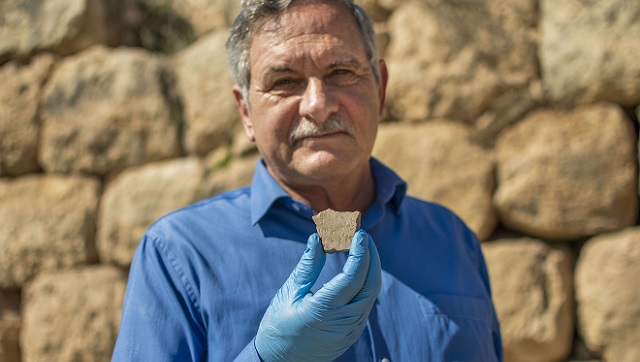The Israel Antiquities Authority would like to inform the public that the archeological find of a 2,500-year-old potsherd – a broken piece of ceramic also called an ostracon – that was thought to bear a brief inscription with the name of the Persian king Darius the Great, the father of King Ahasuerus, is not authentic. (See full story here.)
Following the publication, the expert who participated in the excavation expedition last August contacted the Israel Antiquities Authority. She is one of the few researchers specializing in ancient Aramaic inscriptions and admitted demonstrating to a group of students the manner in which sherds were inscribed in ancient times.
She then left the sherd on the site, which led to the erroneous identification. She was questioned and said this was done unintentionally and without malice.
Will you offer us a hand? Every gift, regardless of size, fuels our future.
Your critical contribution enables us to maintain our independence from shareholders or wealthy owners, allowing us to keep up reporting without bias. It means we can continue to make Jewish Business News available to everyone.
You can support us for as little as $1 via PayPal at office@jewishbusinessnews.com.
Thank you.
“The IAA takes full responsibility for the unfortunate event” Prof. Gideon Avni, the IAA’s chief scientist explained. “The sherd was examined by Dr. Haggai Misgav, a leading researcher on ancient Aramaic script and Sa’ar Ganor, an archaeologist studying the site of Tell Lachish and its region.
“However, as it turns out, the find does not bear an ancient inscription. As an institution that strives for the scientific truth, weare committed to correcting the mistake that was made and making it known to the public. In terms of ethical and scientific practices, we see this as a very severe occurrence. Leaving the newly inscribed sherd on the site was careless, and led to the mistake done by the researchers and distorted the scientific truth. Such cases in archaeological research are very few in number.”
“The event illustrates the dangers of adding modern scripts on ancient artifacts – a phenomena which troubles the entire scientific community for many years. On top of the paleographic examination of the sherd by an experienced epigraphist, the sherd was examined in various laboratories and found to be ancient. This once again proves that only finds discovered in controlled archaeological excavations should be considered 100% authentic. All other finds should raise questions regarding their authenticity.”
As a result of this unfortunate occurrence, the Israel Antiquities Authority said that it will refresh “proper procedures and policies with all foreign expeditions working in the country.”




